

How to Encourage Students to Master the AP Lit Thesis
- December 1, 2021
- AP Literature , Writing
For years, I have used a Poem of the Week as part of my poetry instruction in AP Literature . Last year, because the pandemic resulted in hybrid instruction and only 50% (or fewer) of my kids were in class at a time, I wanted to be sure that I put some significant emphasis on AP Lit thesis writing.
As part of our weekly poem study, the Friday prompt became an AP-style poetry essay prompt. Students only needed to write a thesis. And early in the year, it became evident that our thesis statements needed work.

AP Literature Thesis Statements and “The Point”
When the College Board came out with the new rubrics in 2019, they set aside a point that is designated for the thesis. It’s one point and students either get it or they don’t. And truthfully, it is not that hard to “get” the point. Students must simply “provide a defensible interpretation in response to the prompt” which could be supported by the text (for more, see AP Central). So in other words, students must be able to find *something* in the text that they can write about beyond a summary.
Early on, I observed two things: 1. Not all AP Lit thesis statement are created equal (even if they do earn the point) and 2. Students needed help moving from making a base claim to making a strong claims that lead to better analysis later in the essay.
AP Lit Thesis Starting Points
At the beginning of the year, my kids were writing things like
- The author uses metaphors to reveal that life gives you new, and endless opportunities each and every day.
- Merriam’s use of her metaphor for a new day in “Metaphor” reveals her positive outlook on life.
- eve marriam’s use of metaphor shows that she feels that every day is new day to write your own story.
- Love can cause pain
- Lowell uses diction and figurative language to show her intimate and spiritual connection to her partner in the poem
- Through Lowell’s uses of poetic elements and techniques, she’s able to carefully convert the speaker’s complex relationship with whoever they’re addressing.
While indeed some of these would earn the thesis point, they do no convey the depth that a good, strong AP Lit thesis will. We want students to address the complexity of the text and these just don’t cut it.
The Issue of Complexity
So the first step in helping students to develop a strong thesis is to get beyond just repeating the topic with a few elements of author’s craft thrown in. They have to be sure that they are fully addressing the complexity of the topic highlighted by the task.
The first set of thesis statements above go with Eve Merriam’s poem “Metaphor.” This is my favorite poem to start the school year with because it reflects where we are. Each school year is also like a “new sheet of paper.”
We spend the week discussing the poem ( My daily prompts are available here. ) Then on Friday, I present students with the following prompt:
In Eve Merriam’s poem “Metaphor” (1986), the speaker portrays the blankness of a new day. In a well written essay, analyze how Merriam uses poetic elements and techniques to convey the speaker’s complex attitude toward life.
And while all of the above thesis statements DO say something about her attitude toward life, none of them get to how it is complex. So the first step is to get students thinking about contrasts within the poem and other elements that help add to the depth of the text. A good way to do this might be through the Interstate, Microscope and Compass Technique from Gina at Lit and More.

AP® Lit Literary Argument
Once students see complexity in a text, they can move into developing a more complex AP® literature thesis statement.
It is also important to remind them that the College Board calls these essays “literary argument.” And an argument is by definition something that has two sides. When we teach argument writing to our English 11 students in preparation for the New York State English Regents we encourage them to include the counterargument in their thesis. And although a literary argument doesn’t necessarily have a counterargument, it should have two sides. In other words, complexity.
In these early stages, it is sometimes useful to give the students complexity starters that they can use as the basis of their thesis statements. This is a list that I provide to my students:
- even though x, y is also true
- not only j, but also k
- although d, also e
- nevertheless
- notwithstanding
- in contrast
This list along with other helpful tips on writing AP Literature Thesis Statements is included in my AP Thesis Anchor charts here .

AP® Lit Thesis Examples
As we work through the year, thesis statements that once read “love can cause pain” become
“Even though Edith Matilda Thomas’s poem entitled “Winter Sleep” appears to be a simplistic take about growing old she also uses poetic elements such as symbolism, diction, and parallel structure to convey a complex attitude towards aging as she looks back on her life.”
“Although the speaker is reflecting on the spring-like happiness of her youth, she understands that death is coming as she moves into the metaphorical winter of her life due to her old age.”

Building on Complexity
The key to helping students earn the thesis point on the AP Literature Rubric is to help them understand that they are writing a literary argument and that an argument by its very nature has two sides or two part. Then include both of those sides in your thesis.
For more help in AP Lit Writing, be sure to check out these other AP Lit Essay Writing Anchor Charts.
more from the blog

11 Short Stories for Fall for High School English
Fall is the perfect time to incorporate a short story unit into any high school class. So today I am sharing 11 short stories for

The Essential Question for Lesson Plans in High School English
This year, I am teaching a course I haven’t taught in about fifteen years. So as I considered how I to plan for this class,

Favorite Bell Ringer Questions and Exit Tickets
As we start to think about going back to school, it is also time to think about the routines we want to establish in our
4 Responses
- Pingback: Teaching Students How to Write Literary Analysis Paper in Six Easy Steps - The Teacher ReWrite
Is there a way to get working links. Both the link to the poem and the link to the daily prompts are both broken and give an error message when clicked.
What are your chances of acceptance?
Calculate for all schools, your chance of acceptance.
Your chancing factors
Extracurriculars.
How to Write the AP Lit Poetry Essay
What’s covered:.
- How to Write the AP Literature Poetry Essay
- Tips for Writing The AP Lit Poetry Essay
To strengthen your AP Literature Poetry Essay essay, make sure you prepare ahead of time by knowing how the test is structured, and how to prepare. In this post, we’ll cover the structure of the test and show you how you can write a great AP Literature Poetry Essay.
What is the AP Lit Poetry Essay?
The AP Literature exam has two sections. Section I contains 55 multiple choice questions, with 1 hour time allotted. This includes at least two prose fiction passages and two poetry passages.
Section II, on the other hand, is a free response section. Here, students write essays to 3 prompts. These prompts include a literary analysis of a poem, prose fiction, or in a work selected by the student. Because the AP Literature Exam is structured in a specific, predictable manner, it’s helpful to prepare yourself for the types of questions you’ll encounter on test day.
The Poetry Essay counts for one-third of the total essay section score, so it’s important to know how to approach this section. You’ll want to plan for about 40 minutes on this question, which is plenty of time to read and dissect the prompt, read and markup the poem, write a brief outline, and write a concise, well-thought out essay with a compelling analysis.
Tips for Writing the AP Lit Poetry Essay
1. focus on the process.
Writing is a process, and so is literary analysis. Think less about finding the right answer, or uncovering the correct meaning of the poem (there isn’t one, most of the time). Read the prompt over at least twice, asking yourself carefully what you need to look for as you read. Then, read the poem three times. Once, to get an overall sense of the poem. Second, start to get at nuance; circle anything that’s recurring, underline important language and diction , and note important images or metaphors. In your annotations, you want to think about figurative language , and poetic structure and form . Third, pay attention to subtle shifts in the poem: does the form break, is there an interruption of some sort? When analyzing poetry, it’s important to get a sense of the big picture first, and then zoom in on the details.
2. Craft a Compelling Thesis
No matter the prompt, you will always need to respond with a substantive thesis. A meaty thesis contains complexity rather than broad generalizations , and points to specifics in the poem.
By examining the colloquial language in Gwendolyn Brooks’s poem, “We Real Cool”, we can see the tension of choosing to be “cool”. This raises important ideas about education, structure, and routine, and the consequences of living to be “real cool”.
Notice how the thesis provides a roadmap of what is to follow in the essay , and identifies key ideas that the essay will explore. It is specific, and not vague. The thesis provides a bigger picture of the text, while zooming in the colloquial language the speaker uses.
A good thesis points out the why as much as the what . Notice how in the above example, the thesis discusses language in the poem as it connects to a bigger message about the poem. For example, it’s not enough to discuss Emily Dickinson’s enjambment and hyphens. A good thesis will make a compelling argument about why those infamous Dickinson hyphens are so widely questioned and examined. Perhaps a good thesis might suggest that this unique literary device is more about self-examination and the lapse in our own judgement.
3. Use Textual Evidence
To support your thesis, always use textual evidence . When you are creating an outline, choose a handful of lines in the poem that will help illuminate your argument. Make sure each claim in your essay is followed by textual evidence, either in the form of a paraphrase, or direct quote . Then, explain exactly how the textual evidence supports your argument . Using this structure will help keep you on track as you write, so that your argument follows a clear narrative that a reader will be able to follow.
Your essay will need to contain both description of the poem, and analysis . Remember that your job isn’t to describe or paraphrase every aspect of the poem. You also need lots of rich analysis, so be sure to balance your writing by moving from explicit description to deeper analysis.
4. Strong Organization and Grammar
A great essay for the AP Literature Exam will contain an introduction with a thesis (not necessarily always the last sentence of the paragraph), body paragraphs that contain clear topic sentences, and a conclusion . Be sure to spend time thinking about your organization before you write the paper. Once you start writing, you only want to think about content. It’s helpful to write a quick outline before writing your essay.
There’s nothing worse than a strong argument with awkward sentences, grammatical errors and spelling mistakes. Make sure to proofread your work before submitting it. Carefully edit your work, paying attention to any run-on sentences, subject-verb agreement, commas, and spelling. You’d be surprised how many mistakes you’ll catch just by rereading your work.
Common Mistakes on the AP Literature Poetry Essay
It can be helpful to know what not to do when it comes time to prepare for the AP Literature Poetry Essay. Here are some common mistakes students make on the AP Literature Poetry Essay:
1. Thesis is not arguable and is too general
Your thesis should be arguable, and indicate the central ideas you will discuss in your essay. Read the prompt carefully and craft your thesis in light of what the prompt asks you to do. If the prompt mentions specific literary devices, find a way to tie those into your thesis. In your thesis, you want to connect to the meaning of the poem itself and what you feel the poet intended when using those particular literary devices.
2. Using vague, general statements rather than focusing on analysis of the poem
Always stay close to the text when writing the AP Literature Poetry Essay. Remember that your job is not to paraphrase but to analyze. Keep explicit descriptions of the poem concise, and spend the majority of your time writing strong analysis backed up by textual evidence.
3. Not using transitions to connect between paragraphs
Make sure it’s not jarring to the reader when you switch to a new idea in a new paragraph. Use transitions and strong topic sentences to seamlessly blend your ideas together into a cohesive essay that flows well and is easy to follow.
4. Textual evidence is lacking or not fully explained
Always include quotes from the text and reference specifics whenever you can. Introduce your quote briefly, and then explain how the quote connects back to the topic sentence after. Think about why the quotes connect back to the poet’s central ideas.
5. Not writing an outline
Of course, to write a fully developed essay you’ll need to spend a few minutes planning out your essay. Write a quick outline with a thesis, paragraph topics and a list of quotes that support your central ideas before getting started.
To improve your writing, take a look at these essay samples from the College Board, with scoring guidelines and commentary.
How Will AP Scores Affect My College Chances?
While you can self-report AP scores, they don’t really affect your admissions chances . Schools are more interested in how you performed in the actual class, as your grades impact your GPA. To understand how your GPA impacts your college chances, use our free chancing engine . We’ll let you know your personal chance of acceptance at over 1500 schools, plus give you tips for improving your profile.
Related CollegeVine Blog Posts

Much Ado About Teaching
Ap lit poetry essay review.

Whenever I prepare my students for the AP Literature exam, I don’t really want it to feel like test prep. I want to take the stress out of it all. I want the experience to build confidence. I want the process, starting around February, to have no stakes or very low stakes; it should be practice, not fear mongering. And I want there to be plenty opportunities for improvement.
So what does that look like?
Well, with essay writing we start small — on the sentence-level — at the beginning of the year, working to achieve mastery over thesis statements, evidence, and commentary. Multiple-choice practice is always completed in class, on paper and while scores are recorded, they never go in the grade book. When my students write full-length essays, they have the opportunity to rewrite as long as they conference with me because I learned long ago that a 15 minute conference with a student is far better than anything I could write in the margins.
But this week I was scratching my head trying to figure out how I could make rubric review NOT feel like test prep. My AP Lit classes were reviewing the Q1 essay, which is the poetry prompt. In my experience, rubrics can suck all the life out of a lesson. Students feel like the speaker in the Walt Whitman’s “When I Heard the Learn’d Astronomer.”
When I heard the learn’d astronomer, When the proofs, the figures, were ranged in columns before me, When I was shown the charts and diagrams, to add, divide, and measure them, When I sitting heard the astronomer where he lectured with much applause in the lecture-room, How soon unaccountable I became tired and sick,
The lesson I devised ended up being one of the more memorable ones of the quarter.
Day 1: Rubric Rhymes — I hand out copies of the Q1 rubric and toss highlighters to each student. They have to highlight the key descriptors for each category and point value on the rubric. Once that is done, students have to use their highlights and develop a poem in rhyming couplets that identifies what must be accomplished in order to score a six on this essay.
The poem had to be at least 10 lines long.
I will say, they loved this assignment and it I think its effect will endure.
Here are some samples:
You wants to make a good poetry essay creation?
That thesis best be full of top notch interpretation
Don’t just restate or rephrase information
But rather provide a good explanation
How many literary elements should you choose?
Multiple is what you should use
And sprinkle on some good seasoning
The one that tastes like strong reasoning
The last criterion to make you do well on your examination
I s make sure the essay demonstrates that advanced type of sophistication
I be writing a thesis
Just like I be eating reese’s, in pieces
If you don’t want evidence that’s horrific
Then you gotta be spec ific
I could ask Stabz for assistance
Or I could remember one word: consistence -y
Unlike my ex,
You gotta be complex
If you tryna get to the graduation
Then you gotta understand sophistication
Student III
You aint got time to waste
But that doesn’t mean that your essay should be written in haste
40 minutes to read and write
And develop ideas with sophistication and insight
First, make sure your thesis isn’t a bore
To develop a sophisticated interpretation really is a chore .
Answer the prompt, be clear and concise ,
Throw in poetic elements and a d evice
That central idea must be developed
Once stated, evidenced and commentary need to envelop
By not just saying what is true, but how and why
With brilliance so bright it would make an AP Reader cry .
S ummarize and your grade will surely suffe r
Articulate the complexity is much tougher
But do it over and over again
Establishing a line of reason, the n
P olish your thoughts like gems
Make those sentences sweet like M&M s
And never forget to discuss what is complex
All these boxes you must chec k
And a six on this essay will be yours
And you will have the wisdom of a thousand Dumbledors .
Day T wo: Performances/The whole-class essay — Class started with an opportunity for students to read their rap/poem in front of the class for extra credit. Some of the performances were epic.
Then I passed out a previous AP prompt and students had seven minutes to complete my four-step pre-writing organizer . Once those seven minutes were up, the fastest typer in class (we had a contest earlier in the year) came to the class computer and we worked together to develop a whole-class essay. This allowed students to think aloud together, wordsmith key phrases, and discuss their insights in a collaborative and non-threatening environment.
Throughout the process, we kept going back to the rubric to check if we were meeting the requirements.
Here are the intros from each class:
Period 1 — In Paul Lawrence Dunbar’s poem “The Mystery”, the speaker discusses navigating through life by himself. Throughout the poem, the speaker exists in a figurative darkness in which he experiences loneliness and questions the benevolence of a higher power; in this frustrated search for meaning and understanding, he illustrates through personification and imagery that whether or not there is a higher power. His conclusion is that he cannot wallow in his dependency and that he must be self reliant.
Period 6 — In Paul Laurence Dunbar’s poem “The Mystery,” the speaker reflects on life. In a state of existential dread, he feels a sense of purposelessness and seeks navigation from a higher being. Paradoxically, in being given no direction, the speaker achieves solace in the inevitability of death and accepts the power of the present.
Period 8 — In Paul Laurence Dunbar’s poem, “The Mystery”, the speaker is in a lonely place of uncertainty. While reflecting on the inevitability of death and appealing to a higher power, the speaker gains an awareness, not only of his own solitude, but also his powerlessness in the face of destiny. Through the use of personification, juxtaposition, and imagery, an epiphany is achieved in which he accepts the absurdity of life, thus gaining his autonomy.
Day 3: Essay test day — At this point students know the rubric, they did a practice essay the day before as a class, and now they are ready to do it all on their own.
In the comments section below, please share how you prepare students for the poetry essay on the AP exam.
Brian Sztabnik is just a man trying to do good in and out of the classroom. He was a 2018 finalist for NY Teacher of the Year, a former College Board advisor for AP Lit, and an award-winning basketball coach.

Elevating Student Writing

8 Things to Know for the AP Literature Exam
You may also like.

“The Barren Moors”

Choice Reading – One Classroom Experience

The AP Exam: Behind the Scenes
Please go to the Instagram Feed settings page to create a feed.

Copyright © 2024 DAHZ All Rights Reserved. Much Ado About Teaching.

AP® English Literature
How to approach ap® english literature free-response questions.
- The Albert Team
- Last Updated On: February 28, 2023
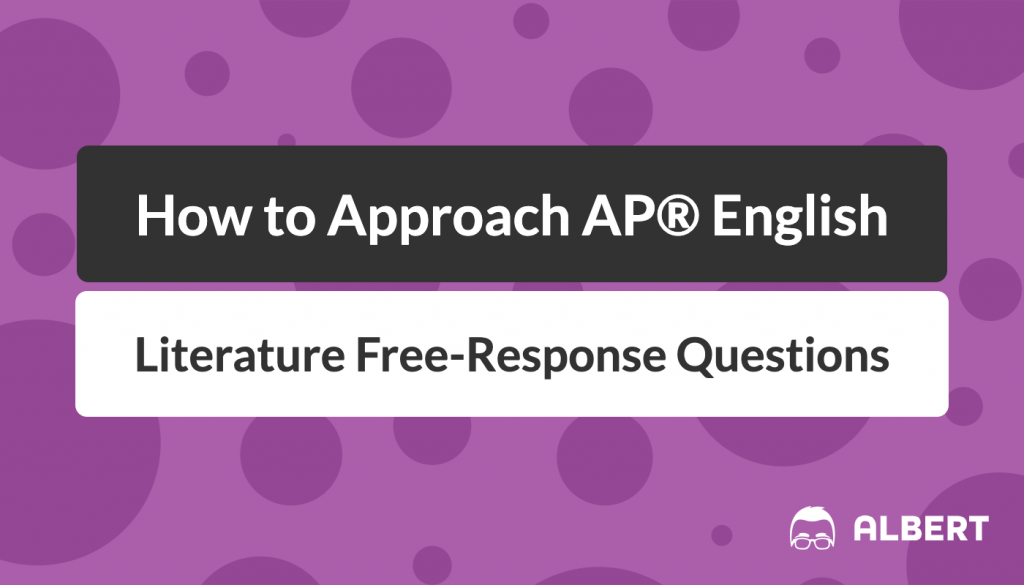
What We Review
What is the Format of AP® English Literature?
What content is covered in the free-response section of ap® english literature.
Return to the Table of Contents
How to Prepare for AP® English Literature Free-Response

Practice Makes Perfect
Focus on critical reading, utilize your syllabus, take notes as you read, carefully consider principal ideas, explore the context, read out loud, reread when necessary, consult your dictionary, thesaurus or encyclopedia, write, review, and rewrite regularly, how to answer ap® english literature free-response questions.

Understand the Subject Matter
Outline your essay, write clearly and eloquently, what are ap® english literature free-response questions like.
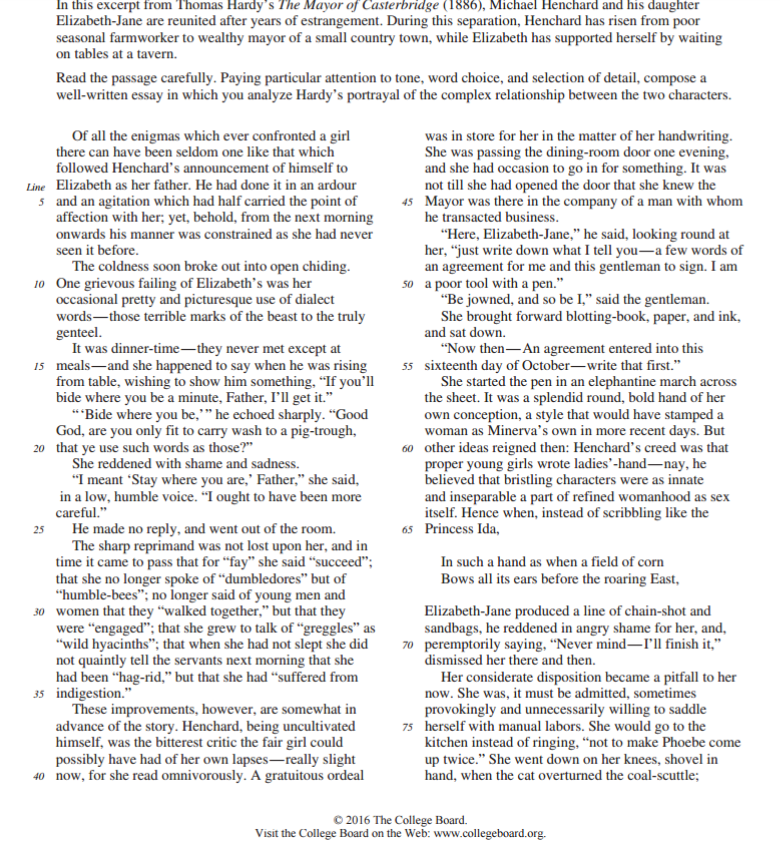
How Can I practice AP® English Literature Free-Response?
Looking for ap® english literature practice, interested in a school license, 2 thoughts on “how to approach ap® english literature free-response questions”.
Are you expected to have read the actual work previously for free response question #1 and #2? (For instance, would the test writers expect you have read Thomas Hardy’s The Mayor of Casterbridge (1886) for 2016 essay?)
Can you still pull out score 5, even if you haven’t read the work before and write your response solely based on the given passage?
Hi Jen, you would not have had to have read the passage before. You’d be expected to be able to interpret from the passage provided — this is how they assess you on your analysis skills.
Comments are closed.
Popular Posts


AP® Score Calculators
Simulate how different MCQ and FRQ scores translate into AP® scores

AP® Review Guides
The ultimate review guides for AP® subjects to help you plan and structure your prep.

Core Subject Review Guides
Review the most important topics in Physics and Algebra 1 .

SAT® Score Calculator
See how scores on each section impacts your overall SAT® score

ACT® Score Calculator
See how scores on each section impacts your overall ACT® score

Grammar Review Hub
Comprehensive review of grammar skills

AP® Posters
Download updated posters summarizing the main topics and structure for each AP® exam.

Choose Your Test
- Search Blogs By Category
- College Admissions
- AP and IB Exams
- GPA and Coursework
Expert's Guide to the AP Literature Exam
Advanced Placement (AP)

If you're planning to take the AP English Literature and Composition exam, you'll need to get familiar with what to expect on the test. Whether the 2023 test date of Wednesday, May 3, is near or far, I'm here to help you get serious about preparing for the exam.
In this guide, I'll go over the test's format and question types, how it's graded, best practices for preparation, and test-day tips. You'll be on your way to AP English Lit success in no time!

AP English Literature: Exam Format and Question Types
The AP Literature Exam is a three-hour exam that contains two sections in this order:
- An hour-long, 55-question multiple-choice section
- A two-hour, three-question free-response section
The exam tests your ability to analyze works and excerpts of literature and cogently communicate that analysis in essay form.
Read on for a breakdown of the two different sections and their question types.
Section I: Multiple Choice
The multiple-choice section, or Section I of the AP Literature exam, is 60 minutes long and has 55 questions. It counts for 45% of your overall exam grade .
You can expect to see five excerpts of prose and poetry. You will always get at least two prose passages (fiction or drama) and two poetry passages. In general, you will not be given the author, date, or title for these works, though occasionally the title of a poem will be given. Unusual words are also sometimes defined for you.
The date ranges of these works could fall from the 16th to the 21st century. Most works will be originally written in English, but you might occasionally see a passage in translation.
There are, generally speaking, eight kinds of questions you can expect to see on the AP English Literature and Composition exam. I'll break each of them down here and give you tips on how to identify and approach them.

"Pretty flowers carried by ladies" is not one of the question types.
The 8 Multiple-Choice Question Types on the AP Literature Exam
Without further delay, here are the eight question types you can expect to see on the AP Lit exam. All questions are taken from the sample questions on the AP Course and Exam Description .
#1: Reading Comprehension
These questions test your ability to understand what the passage is saying on a pretty basic level . They don't require you to do a lot of interpretation—you just need to know what's going on.
You can identify this question type from words and phrases such as "according to," "mentioned," "asserting," and so on. You'll succeed on these questions as long as you carefully read the text . Note that you might have to go back and reread parts to make sure you understand what the passage is saying.

#2: Inference
These questions ask you to infer something—a character or narrator's opinion, an author's intention, etc.—based on what is said in the passage . It will be something that isn't stated directly or concretely but that you can assume based on what's clearly written in the passage. You can identify these questions from words such as "infer" and "imply."
The key to these questions is to not get tripped up by the fact that you are making an inference—there will be a best answer, and it will be the choice that is best supported by what is actually found in the passage .
In many ways, inference questions are like second-level reading comprehension questions: you need to know not just what a passage says, but also what it means.

#3: Identifying and Interpreting Figurative Language
These are questions for which you have to either identify what word or phrase is figurative language or provide the meaning of a figurative phrase . You can identify these as they will either explicitly mention figurative language (or a figurative device, such as a simile or metaphor ) or include a figurative phrase in the question itself.
The meaning of figurative phrases can normally be determined by that phrase's context in the passage—what is said around it? What is the phrase referring to?
Example 1: Identifying
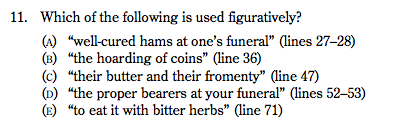
Example 2: Interpreting

#4: Literary Technique
These questions involve identifying why an author does what they do , from using a particular phrase to repeating certain words. Basically, what techniques is the author using to construct the passage/poem, and to what effect?
You can identify these questions by words/phrases such as "serves chiefly to," "effect," "evoke," and "in order to." A good way to approach these questions is to ask yourself: so what? Why did the author use these particular words or this particular structure?

#5: Character Analysis
These questions ask you to describe something about a character . You can spot them because they will refer directly to characters' attitudes, opinions, beliefs, or relationships with other characters .
This is, in many ways, a special kind of inference question , since you are inferring the broader personality of the character based on the evidence in a passage. Also, these crop up much more commonly for prose passages than they do for poetry ones.

#6: Overall Passage Questions
Some questions ask you to identify or describe something about the passage or poem as a whole : its purpose, tone, genre, etc. You can identify these by phrases such as "in the passage" and "as a whole."
To answer these questions, you need to think about the excerpt with a bird's-eye view . What is the overall picture created by all the tiny details?

#7: Structure
Some AP Lit questions will ask you about specific structural elements of the passage: a shift in tone, a digression, the specific form of a poem, etc . Often these questions will specify a part of the passage/poem and ask you to identify what that part is accomplishing.
Being able to identify and understand the significance of any shifts —structural, tonal, in genre, and so on—will be of key importance for these questions.

#8: Grammar/Nuts & Bolts
Very occasionally you will be asked a specific grammar question , such as what word an adjective is modifying. I'd also include in this category super-specific questions such as those that ask about the meter of a poem (e.g., iambic pentameter).
These questions are less about literary artistry and more about the fairly dry technique involved in having a fluent command of the English language .
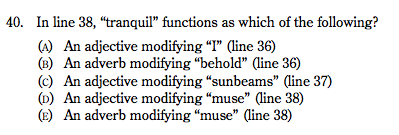
That covers the eight question types on the multiple-choice section. Now, let's take a look at the free-response section of the AP Literature exam.

Keep track of the nuts and bolts of grammar.
Section II: Free Response
The AP Literature Free Response section is two hours long and involves three free-response essay questions , so you'll have about 40 minutes per essay. That's not a lot of time considering this section of the test counts for 55% of your overall exam grade !
Note, though, that no one will prompt you to move from essay to essay, so you can theoretically divide up the time however you want. Just be sure to leave enough time for each essay! Skipping an essay, or running out of time so you have to rush through one, can really impact your final test score.
The first two essays are literary analysis essays of specific passages, with one poem and one prose excerpt. The final essay is an analysis of a given theme in a work selected by you , the student.
Essays 1 & 2: Literary Passage Analysis
For the first two essays, you'll be presented with an excerpt and directed to analyze the excerpt for a given theme, device, or development . One of the passages will be poetry, and one will be prose. You will be provided with the author of the work, the approximate date, and some orienting information (i.e., the plot context of an excerpt from a novel).
Below are some sample questions from the 2022 Free Response Questions .

Essay 3: Thematic Analysis
For the third and final essay, you'll be asked to discuss a particular theme in a work that you select . You will be provided with a list of notable works that address the given theme below the prompt, but you can also choose to discuss any "work of literary merit."
So while you do have the power to choose which work you wish to write an essay about , the key words here are "literary merit." That means no genre fiction! Stick to safe bets like authors in the list on pages 10-11 of the old 2014 AP Lit Course Description .
(I know, I know—lots of genre fiction works do have literary merit and Shakespeare actually began as low culture, and so on and so forth. Indeed, you might find academic designations of "literary merit" elitist and problematic, but the time to rage against the literary establishment is not your AP Lit test! Save it for a really, really good college admissions essay instead .)
Here's a sample question from 2022:
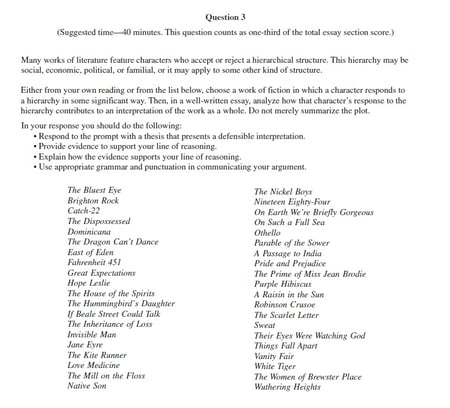
As you can see, the list of works provided spans many time periods and countries : there are ancient Greek plays ( Antigone ), modern literary works (such as Margaret Atwood's The Handmaid's Tale ), Shakespeare plays ( The Tempest ), 19th-century English plays ( The Importance of Being Earnest ), etc. So you have a lot to work with!
Also note that you can choose a work of "comparable literary merit." That means you can select a work not on this list as long as it's as difficult and meaningful as the example titles you've been given. So for example, Jane Eyre or East of Eden would be great choices, but Twilight or The Hunger Games would not.
Our advice? If you're not sure what a work of "comparable literary merit" is, stick to the titles on the provided list .
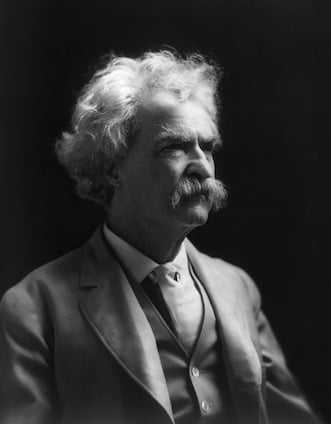
You might even see something by this guy.
How Is the AP Literature Test Graded?
The multiple-choice section of the exam comprises 45% of your total exam score; the three essays, or free-response section, comprise the other 55%. Each essay, then, is worth about 18% of your grade.
As on other AP exams, your raw score will be converted to a score from 1-5 . You don't have to get every point possible to get a 5 by any means. In 2022, 16.9% of students received 5s on the AP English Literature test, the 14th highest 5 score out of the 38 different AP exams.
So, how do you calculate your raw scores?
Multiple-Choice Scoring
For the multiple-choice section, you receive 1 point for each question you answer correctly . There's no guessing penalty, so you should answer every question—but guess only after you're able to eliminate any answer you know is wrong to up your chances of choosing the right one.
Free-Response Scoring
Scoring for multiple choice is pretty straightforward; however, essay scoring is a little more complicated.
Each of your essays will receive a score from 0 to 6 based on the College Board rubric , which also includes question-specific rubrics. All the rubrics are very similar, with only minor differences between them.
Each essay rubric has three elements you'll be graded on:
- Thesis (0-1 points)
- Evidence and Commentary (0-4 points)
- Sophistication (0-1 points)
We'll be looking at the current rubric for the AP Lit exam , which was released in September 2019, and what every score means for each of the three elements above:
| Restates prompt. Makes generalized comment. Describes work rather than making a claim. | Is incoherent or does not address prompt. May be just opinion with no textual references or references that are irrelevant. | Attempts to contextualize interpretation consist mainly of sweeping generalizations. Only hints at other interpretations. Does not consistently maintain thematic interpretation. Oversimplifies complexities. Uses overly complex language. | |
| Provides defensible interpretation in response to prompt. | Focuses on broad elements, summary, or description rather than specific details or techniques. Mentions literary elements, devices, or techniques with little or no explanation. | Identifies and explores complexities/tensions within work. Situates interpretation within broader context. Accounts for alternative interpretations. Style is consistently vivid and persuasive. | |
| — | Consists of mix of specific evidence and broad generalities. May contain some simplistic, inaccurate, or repetitive explanations. Does not make multiple supporting claims or does not support more than one claim. No clear connections or progression between claims. | — | |
| — | Uniformly offers evidence to support claims. Focuses on importance of specific words and details. Organizes argument as line of reasoning composed of several supporting claims. Commentary may fail to integrate some evidence or support key claim. | — | |
| — | Uniformly offers evidence to support claims. Focuses on importance of specific words and details. Organizes argument as line of reasoning composed of several supporting claims, each with adequate evidence. Explains how use of literary techniques contributes to interpretation. | — |
To get a high-scoring essay in the 5-6 point range, you'll need to not only come up with an original and intriguing argument that you thoroughly support with textual evidence, but you’ll also need to stay focused, organized, and clear. And all in just 40 minutes per essay!
If getting a high score on this section sounds like a tall order, that's because it is.

Practice makes perfect!
Skill-Building for Success on the AP Literature Exam
There are several things you can do to hone your skills and best prepare for the AP Lit exam.
Read Some Books, Maybe More Than Once
One of the most important steps you can take to prepare for the AP Literature and Composition exam is to read a lot and read well . You'll be reading a wide variety of notable literary works in your AP English Literature course, but additional reading will help you further develop your analytical reading skills .
I suggest checking out this list of notable authors in the 2014 AP Lit Course Description (pages 10-11).
In addition to reading broadly, you'll want to become especially familiar with the details of four to five books with different themes so you'll be prepared to write a strong student-choice essay. You should know the plot, themes, characters, and structural details of these books inside and out.
See my AP English Literature Reading List for more guidance.
Read (and Interpret) Poetry
One thing students might not do very much on their own time but that will help a lot with AP Lit exam prep is to read poetry. Try to read poems from a lot of eras and authors to get familiar with the language.
We know that poetry can be intimidating. That's why we've put together a bunch of guides to help you crack the poetry code (so to speak). You can learn more about poetic devices —like imagery and i ambic pentameter —in our comprehensive guide. Then you can see those analytical skills in action in our expert analysis of " Do not go gentle into that good night " by Dylan Thomas.
When you think you have a grip on basic comprehension, you can then move on to close reading (see below).
Hone Your Close Reading and Analysis Skills
Your AP class will likely focus heavily on close reading and analysis of prose and poetry, but extra practice won't hurt you. Close reading is the ability to identify which techniques the author is using and why. You'll need to be able to do this both to gather evidence for original arguments on the free-response questions and to answer analytical multiple-choice questions.
Here are some helpful close reading resources for prose :
- University of Wisconsin-Madison Writing Center's guide to close reading
- Harvard College Writing Center's close reading guide
- Purdue OWL's article on steering clear of close reading "pitfalls"
And here are some for poetry :
- University of Wisconsin-Madison's poetry-reading guide
- This guide to reading poetry at Poets.org (complete with two poetry close readings)
- Our own expert analyses of famous poems, such as " Ozymandias ", and the 10 famous sonnets you should know
Learn Literary and Poetic Devices
You'll want to be familiar with literary terms so that any test questions that ask about them will make sense to you. Again, you'll probably learn most of these in class, but it doesn't hurt to brush up on them.
Here are some comprehensive lists of literary terms with definitions :
- The 31 Literary Devices You Must Know
- The 20 Poetic Devices You Must Know
- The 9 Literary Elements You'll Find In Every Story
- What Is Imagery?
- Understanding Assonance
- What Is Iambic Pentameter in Poetry?
- Simile vs Metaphor: The 1 Big Difference
- 10 Personification Examples in Poetry, Literature, and More
Practice Writing Essays
The majority of your grade on the AP English Lit exam comes from essays, so it's critical that you practice your timed essay-writing skills . You of course should use the College Board's released free-response questions to practice writing complete timed essays of each type, but you can also practice quickly outlining thorough essays that are well supported with textual evidence.
Take Practice Tests
Taking practice tests is a great way to prepare for the exam. It will help you get familiar with the exam format and overall experience . You can get sample questions from the Course and Exam Description , the College Board website , and our guide to AP English Lit practice test resources .
Be aware that the released exams don't have complete slates of free-response questions, so you might need to supplement these with released free-response questions .
Since there are three complete released exams, you can take one toward the beginning of your prep time to get familiar with the exam and set a benchmark, and one toward the end to make sure the experience is fresh in your mind and to check your progress.

Don't wander like a lonely cloud through your AP Lit prep.
AP Literature: 6 Critical Test-Day Tips
Before we wrap up, here are my six top tips for AP Lit test day:
- #1: On the multiple-choice section, it's to your advantage to answer every question. If you eliminate all the answers you know are wrong before guessing, you'll raise your chances of guessing the correct one.
- #2: Don't rely on your memory of the passage when answering multiple-choice questions (or when writing essays, for that matter). Look back at the passage!
- #3: Interact with the text : circle, mark, underline, make notes—whatever floats your boat. This will help you retain information and actively engage with the passage.
- #4: This was mentioned above, but it's critical that you know four to five books well for the student-choice essay . You'll want to know all the characters, the plot, the themes, and any major devices or motifs the author uses throughout.
- #5: Be sure to plan out your essays! Organization and focus are critical for high-scoring AP Literature essays. An outline will take you a few minutes, but it will help your writing process go much faster.
- #6: Manage your time on essays closely. One strategy is to start with the essay you think will be the easiest to write. This way you'll be able to get through it while thinking about the other two essays.

And don't forget to eat breakfast! Apron optional.
AP Literature Exam: Key Takeaways
The AP Literature exam is a three-hour test that includes an hour-long multiple-choice section based on five prose and poetry passages and with 55 questions, and a two-hour free-response section with three essays : one analyzing a poetry passage, one analyzing a prose passage, and one analyzing a work chosen by you, the student.
The multiple-choice section is worth 45% of your total score , and the free-response section is worth 55% . The three essays are each scored on a rubric of 0-6, and raw scores are converted to a final scaled score from 1 to 5.
Here are some things you can do to prepare for the exam:
- Read books and be particularly familiar with four to five works for the student-choice essays
- Read poetry
- Work on your close reading and analysis skills
- Learn common literary devices
- Practice writing essays
- Take practice tests!
On test day, be sure to really look closely at all the passages and really interact with them by marking the text in a way that makes sense to you. This will help on both multiple-choice questions and the free-response essays. You should also outline your essays before you write them.
With all this in mind, you're well on your way to AP Lit success!
What's Next?
If you're taking other AP exams this year, you might be interested in our other AP resources: from the Ultimate Guide to the US History Exam , to the Ultimate AP Chemistry Study Guide , to the Best AP Psychology Study Guide , we have tons of articles on AP courses and exams for you !
Looking for practice exams? Here are some tips on how to find the best AP practice tests . We've also got comprehensive lists of practice tests for AP Psychology , AP Biology , AP Chemistry , and AP US History .
Deciding which APs to take? Take a look through the complete list of AP courses and tests , read our analysis of which AP classes are the hardest and easiest , and learn how many AP classes you should take .

Trending Now
How to Get Into Harvard and the Ivy League
How to Get a Perfect 4.0 GPA
How to Write an Amazing College Essay
What Exactly Are Colleges Looking For?
ACT vs. SAT: Which Test Should You Take?
When should you take the SAT or ACT?
Get Your Free

Find Your Target SAT Score
Free Complete Official SAT Practice Tests
How to Get a Perfect SAT Score, by an Expert Full Scorer
Score 800 on SAT Math
Score 800 on SAT Reading and Writing
How to Improve Your Low SAT Score
Score 600 on SAT Math
Score 600 on SAT Reading and Writing
Find Your Target ACT Score
Complete Official Free ACT Practice Tests
How to Get a Perfect ACT Score, by a 36 Full Scorer
Get a 36 on ACT English
Get a 36 on ACT Math
Get a 36 on ACT Reading
Get a 36 on ACT Science
How to Improve Your Low ACT Score
Get a 24 on ACT English
Get a 24 on ACT Math
Get a 24 on ACT Reading
Get a 24 on ACT Science
Stay Informed
Get the latest articles and test prep tips!

Ellen has extensive education mentorship experience and is deeply committed to helping students succeed in all areas of life. She received a BA from Harvard in Folklore and Mythology and is currently pursuing graduate studies at Columbia University.
Ask a Question Below
Have any questions about this article or other topics? Ask below and we'll reply!

IMAGES
COMMENTS
Download free-response questions from this year's exam and past exams along with scoring guidelines, sample responses from exam takers, and scoring distributions. If you are using assistive technology and need help accessing these PDFs in another format, contact Services for Students with Disabilities at 212-713-8333 or by email at ssd@info ...
To get a 9 on the poetry analysis essay in the AP® Literature and Composition exam, practice planning a response under strict time deadlines. Write as many practice essays as you can. Follow the same procedure each time. First, be sure to read the instructions carefully, highlighting the parts of the prompt you absolutely must cover.
Question 1: Poetry Analysis (2019) Sample Student Responses 4 Sample T [1] In their poem, ^The Landlady, P.K. Page illustrates the life of a landlady and how her actions result in her playing multiple roles in the lives of her boarders. Through their use of irony and
• The thesis may be more than one sentence, provided the sentences are in close proximity. • The thesis may be anywhere within the response. • For a thesis to be defensible, the poem must include at least minimal evidence that could be used to support that thesis; however, the student need not cite that evidence to earn the thesis point.
Even though templates can be as restrictive as they are helpful, they do tend to provide writers (especially writers new to AP) with a basic "road map" of how to write an effective thesis for the AP FRQ questions. Writing Thesis Statements. 2+ LIT TOOLS the author used to get you to see what the MOWAW was. Through [his/her] use of [tool, tool ...
So in other words, students must be able to find *something* in the text that they can write about beyond a summary. Early on, I observed two things: 1. Not all AP Lit thesis statement are created equal (even if they do earn the point) and 2. Students needed help moving from making a base claim to making a strong claims that lead to better ...
The AP Literature exam has two sections. Section I contains 55 multiple choice questions, with 1 hour time allotted. This includes at least two prose fiction passages and two poetry passages. Section II, on the other hand, is a free response section. Here, students write essays to 3 prompts.
Question 1. (Suggested time—40 minutes. This question counts as one-third of the total essay section score.) In Alice Cary's poem "Autumn," published in 1874, the speaker contemplates the onset of autumn. Read the poem carefully.
Step One: Find the "Command" and "Conquer". Create the "Conquer Question" BEFORE reading. Find the "Command" and "Conquer". Let's consider the prompt from the AP Lit 2018 poetry analysis prompt for a second: Carefully read Olive Senior's 2005 poem "Plants." Then, in a well-organized essay, analyze how the poet portrays the complex relationship ...
Free-Response Question 1: POETRY ANALYSIS Free-response Question 1 presents students with a passage of poetry of approximately 100 to 300 words. This question assesses your ability to do the following: • Respond to the prompt with a thesis that presents a defensible interpretation.
Free-Response Question 1: Poetry Analysis Free-Response Question 2: Prose Fiction Analysis . Free-Response Question 3: Literary Argument . Efective ... The intended thesis simply describes the poem or features of the poem rather than making a claim that requires a defense. Responses that earn this point: •
Question 1. (Suggested time—40 minutes. This question counts as one-third of the total essay section score.) In Ai's poem "The Man with the Saxophone," published in 1985, the speaker encounters a man playing a saxophone. Read the poem carefully.
• The thesis may be more than one sentence, provided the sentences are in close proximity. • The thesis may be anywhere within the response. • For a thesis to be defensible, the poem must include at least minimal evidence that . could. be used to support that thesis; however, the student need not cite that evidence to earn the thesis point.
1977 Poem: "Piano" [2 poems with the same name] (D. H. Lawrence) Prompt: Read both poems carefully and then write an essay in which you explain what characteristics of the second poem make it better than the first. Refer specifically to details of both poems. (1) Piano by D. H. Lawrence Somewhere beneath that piano's superb sleek black
The writing often demonstrates a lack of control over the conventions of composition: inadequate development of ideas, accumulation of errors, or a focus that is unclear, inconsistent, or repetitive. Essays scored a 3 may contain significant misreading and/or demonstrate inept writing. 2−1 These essays compound the weaknesses of the papers in ...
My AP Lit classes were reviewing the Q1 essay, which is the poetry prompt. In my experience, rubrics can suck all the life out of a lesson. Students feel like the speaker in the Walt Whitman's "When I Heard the Learn'd Astronomer.". When I heard the learn'd astronomer, When the proofs, the figures, were ranged in columns before me,
It is comprised of three free-response essays and 55 multiple-choice questions. The free-response section accounts to 55% of your score. You will be given two hours to complete three free-response essays. The first will correspond to a given poem. The second will be regarding an excerpt from prose fiction or drama.
Question 1: Poetry Analysis 6 points . In Ai's poem "The Man with the Saxophone," published in 1985, the speaker encounters a man playing a saxophone. Read the poem carefully. Then, in a well-written essay, analyze how Ai uses literary elements and techniques to convey the complexity of the speaker's encounter with the saxophone
Directions. Have students complete the Olive Senior FRQ#1 prompt on "Plants" in real AP time of 40 minutes. This is best done as a FORMATIVE assessment only and used as a diagnostic "before picture." Discuss the thesis section of the rubric. What makes an effective thesis, what are some must-haves, and so on.
1: Poetry Analysis. poem with no connection to prompt poetic features without making a claim. poem. Summary of poem rather than discussion of details or poetic techniques Literary elements and devices mentioned but not explained. thesis. Words and details from poem build the interpretation Multiple claims are included Slight lapses in support ...
AP English Literature and Composition 2022 Free-Response Questions Author: ETS Subject: Free-Response Questions from the 2022 AP English Literature and Composition Exam Keywords: English Literature and Composition; Free-Response Questions; 2022; exam resources; exam information; teaching resources; exam practice Created Date: 10/19/2021 1:40:00 PM
The AP Literature exam is a three-hour test that includes an hour-long multiple-choice section based on five prose and poetry passages and with 55 questions, and a two-hour free-response section with three essays: one analyzing a poetry passage, one analyzing a prose passage, and one analyzing a work chosen by you, the student.
• The thesis may be more than one sentence, provided the sentences are in close proximity. • The thesis may be anywhere within the response. • For a thesis to be defensible, the poem must include at least minimal evidence that . could. be used to support that thesis; however, the student need not cite that evidence to earn the thesis point.